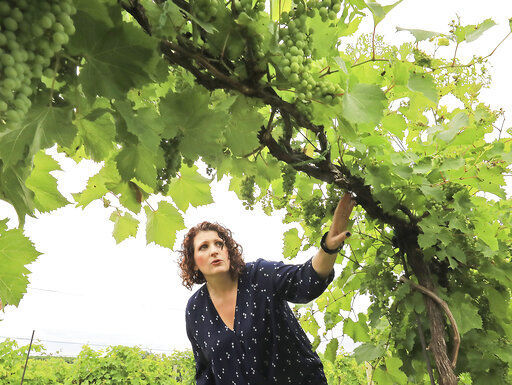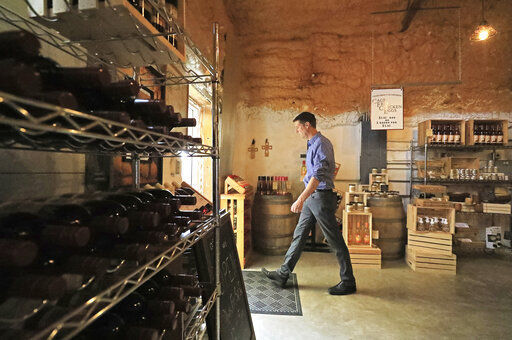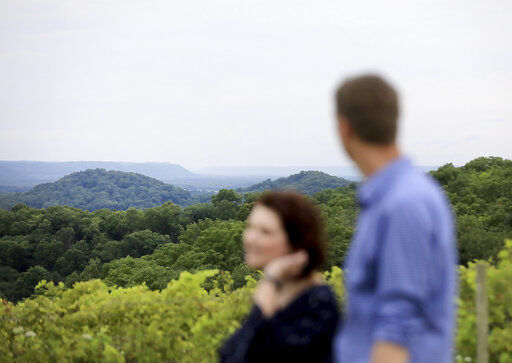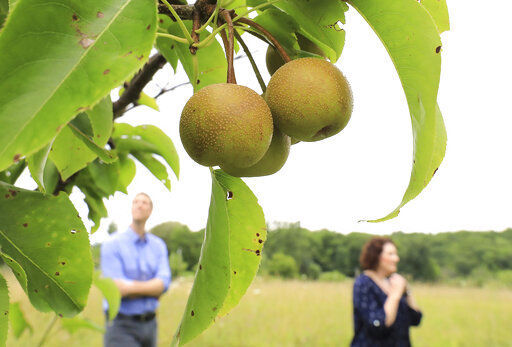MUSCODA, Wis. — The ridge a few miles north of here holds 20 varieties of grapes, orchards filled with peach, apple, cherry, apricot and other fruit trees and one of the largest black currant patches in the state.
What sold Colleen and Aaron Halverson on this 81-acre property in southern Richland County was the panoramic view of the Wisconsin River Valley.
For years, the vista has been largely off the beaten path for visitors to Weggy Winery, where the tasting room is in a former dairy barn with a stone foundation and in a low spot on the property. But for the Halversons, she a professor and novelist and he a certified public accountant, the view is as much a part of the business plan as the produce that is harvested and converted to red, white and fruit wines.
“It might be one of the most amazing views in the county,” said Aaron Halverson, who grew up in Richland Center and has relatives buried on a farmstead just over a mile from the winery. “We have an appreciation for the ridge.”
In November, the Halversons did more than admire the view. They purchased the winery property and business, changed its name to Wild Hills Winery and have plans to build a tasting room with a deck in the midst of the vineyard where the stunning views will become a centerpiece of the operation.
They’ve already added vineyard tours, picnics in the pear orchard, cheese and wine tastings and outdoor yoga classes. The existing tasting room has been remodeled and stocked with an array of locally made products such as meats, wooden bowls, candles, fudge, beer, honey and maple syrup.
They expect to sell out of Weggy Winery wine by next spring and begin adding Wild Hills wine to the inventory later this summer with wine made last fall that is being stored in stainless steel tanks.
The coronavirus, however, was never part of the plan. Tour buses no longer come and music events have been canceled. For now, the tables and chairs in the tasting room have been removed in favor of outdoor seating.
“It really wasn’t on our risk assessment bingo card,” Colleen Halverson, 40, said of the pandemic. “But we’ll get thought this. We really want to do this right. Our focus will really be on the outdoors because a lot of people don’t want to do some of the normal things they had been doing (before COVID-19). It’s going to be a whole experience for people when they come here.”
170-plus years
Wisconsin has a long history with grapes and wineries. The first commercial vines were planted in the town of Roxbury in the late 1840s by Hungarian Count Agoston Haraszthy, who later became known as the founder of the California wine industry. German immigrant Peter Kehl then took over the site and made wine on the grounds until 1899.
It would be another 73 years until Bob Wollersheim purchased the property and resumed the business, which is now Wollersheim Winery & Distillery and the largest winery in the state. The oldest, however, is von Stiehl Winery, established in 1967 in Algoma when there were no other wineries in the state.
In 2000, there were 13 wineries in Wisconsin. But during the past 20 years that number has ballooned to more than 120 that combined make about 800,000 gallons of wine a year, or about 4% of what is consumed by Wisconsin wine drinkers, according to the Wisconsin Wineries Association.
Some wineries, like Wild Hills, grow their own grapes, others purchase grapes or juice from growers and for some it’s a combination of buying and growing. Wineries can be located in rural areas but increasingly are popping up in urban areas, like Fisher King Winery in Verona and Northleaf Winery in Milton.
Stable Rock
In 2011, Rob Lewis converted an old gas station in downtown Lake Mills into Lewis Station Winery. He has since added food and draws tourists from nearby Rock Lake and off of Interstate 94.
The latest venture for Lewis is in Jefferson, where he has converted a historic downtown building along the Rock River into Stable Rock Winery & Distillery. The building was just 60 days away from being razed to make way for a parking lot before city officials convinced Lewis last year to remodel it. Stable Rock Winery & Distillery opened July 15 for business.
“What appealed to them was finding someone that had passion and energy to put something into a project to bring it back to life,” Lewis said. “That’s what I loved about doing Lewis Station. And when we walked through this building (in Jefferson), an old horse stable, essentially, I fell in love with it.”
The city gave Lewis the property as long he spent more than $130,000 on the project. He’s since spent $370,000 on improvements that include a new roof, 27 new windows, the addition of a bay window to provide views of the river and the installation of nine furnaces and eight air-conditioning units. There’s an outdoor patio and the wine cellar is on the lower level of the building that was constructed in 1903 and used as a stable for the nearby Jefferson House Hotel.
Both wine and spirits are bottled in the basement of Stable Rock but juice is purchased from growers in California, Oregon and Washington and turned to wine in a Lake Mills industrial park facility before being shipped in bulk to Jefferson. Bulk spirits are purchased from Kentucky and are being sought from local distillers and are shipped directly to Stable Rock where they are also bottled.
Wines include a Rock River White and Rock River Red and the Jeffersonian, a Cabernet aged in rum barrels. The city’s German heritage is honored with a German-style Riesling and a menu that includes pretzels, weisswurst, bratwurst and currywurst, German potato salad and a pizza topped with German sausages and pickled red cabbage. A wine is also scheduled for next fall to correspond with the community’s German festival, Gemuetlichkeit Days, which was canceled this year.
Coronavirus adjustments for Lewis have included hand-sanitizing stations, employees wearing masks and rubber gloves, and the facility operating at 50 percent capacity. Wine tastings at the bar have been replaced with flights where customers sample four wines at their table instead of congregating at the bar. Lewis, who has not distributed his products in the past, has also reached out to the Piggly Wiggly in Jefferson and Lake Mills Market to carry his wines.
“My business model had to change somewhat,” Lewis said. “Was I worried? Yeah, but it’s about smart practices now that you know will carry you through this. It’s really made us relook at how we operate our business in general.”
A rebirth
Back in Richland County, the story for the Halversons is of rejuvenation and growth and expanding on the legacy of Marion and Marlys Weglarz, who planted their first vines in 1992 and began making wine in 2004. Their vineyard typically yielded 50,000 to 80,000 pounds of grapes a season depending on conditions and produced about 2,000 gallons of wine a year.
The Halversons are hoping to grow production to 10,000 gallons a year and create a line of hard ciders but reduce the number of wine varieties to something less than the 40 produced by Weggy.
“We have a vision for it that’s a little bit different than what they were doing,” Aaron Halverson said. “It’s going to be a while before we get to where we want to be but we see the potential.”
The Driftless Region, with its terrain, appears to be a natural environment for a winery.
The region already includes Botham Vineyards & Winery near Barneveld, Spurgeon Vineyards & Winery near Highland, Vernon Vineyards northwest of Viroqua, Branches Winery near Westby, Whispering Bluffs Winery in Cassville and Hawks Mill Winery in Browntown.
There’s also Potosi Brewing Co. and the National Brewing Museum in Potosi, Driftless Brewing Co. in Soldier’s Grove while Hillsboro Brewing Co. completed last year a $1 million transformation of a 1914 building that includes a tasting room, brewing operation and second-floor event space.
The Halversons want to tap into that vibe, which also includes paddling on the Wisconsin River, world-class trout fishing on hundreds of small streams and artists and foodies throughout the region.
Aaron Halverson, 42, grew up in Richland Center, where his father owned and operated an accounting firm. After graduating from UW-Madison, Halverson moved to Milwaukee, where he traveled the world working in mergers and acquisitions for Kohler Co. in Sheboygan County.
He met Colleen, who has a doctorate in Irish literature, on a blind date. After they married, the couple returned to live in Richland Center, where Aaron purchased his father’s firm and Colleen has since written seven romance novels and teaches online writing courses for educators.
The Halversons later purchased a lodge on the Wisconsin River that they rent out to tourists and want to use that experience to add luxury cabins at the winery and ultimately a wedding pavilion in an effort to create a destination that includes more than just wine and cheese.
“We want to leverage the space and we want to do things that are different,” said Colleen. “The biggest challenge is that we have really big dreams.”





